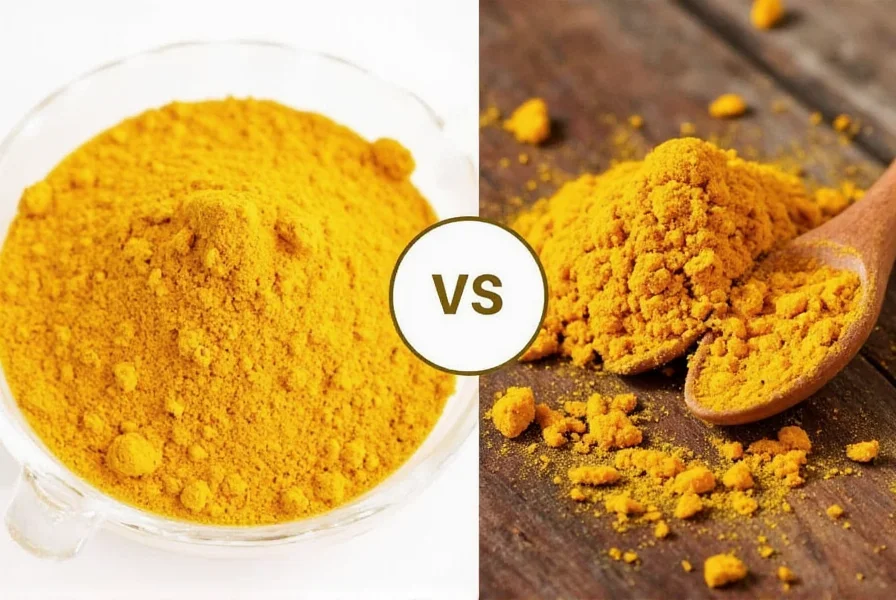Combining apple cider vinegar with turmeric has gained significant popularity in natural health circles. This golden-toned mixture appears in countless wellness blogs, social media posts, and kitchen cabinets worldwide. But what does science actually say about this trending combination? Let's examine the evidence behind this popular wellness practice without the hype.
The Science Behind the Ingredients
Understanding each component separately helps clarify what the combination might—and might not—deliver.
Apple Cider Vinegar: More Than Just Acetic Acid
Apple cider vinegar (ACV) contains acetic acid as its primary active component, typically making up 5-6% of the liquid. During fermentation, apples' sugars convert to alcohol and then to acetic acid through bacterial action. Quality ACV includes "the mother"—a cloudy substance containing enzymes, proteins, and beneficial bacteria.
Research suggests potential benefits of apple cider vinegar for blood sugar regulation. A 2020 review noted that vinegar consumption might improve insulin sensitivity after meals. However, most studies use small sample sizes and short durations, limiting definitive conclusions about long-term effects.

Turmeric: Nature's Golden Spice
Turmeric's primary active compound, curcumin, constitutes about 2-8% of the spice. This polyphenol gives turmeric its distinctive yellow color and has been the subject of extensive research. According to a comprehensive review, curcumin demonstrates anti-inflammatory and antioxidant properties in laboratory settings.
The challenge with turmeric lies in bioavailability. Curcumin isn't easily absorbed by the body. Consuming it with black pepper (which contains piperine) can increase absorption by up to 2,000%, according to research published in Planta Medica. This explains why many turmeric recipes include black pepper.
Evidence-Based Benefits of the Combination
When examining the scientific literature on apple cider vinegar with turmeric, several potential benefits emerge, though with important caveats.
| Claimed Benefit | Scientific Support | Important Considerations |
|---|---|---|
| Anti-inflammatory effects | Moderate (primarily from turmeric) | Most evidence comes from lab studies; human trials limited |
| Digestive support | Preliminary (from ACV) | May help some people; can worsen symptoms for others |
| Blood sugar management | Some evidence (from ACV) | Effects modest; not replacement for diabetes medication |
| Weight loss | Minimal | No evidence the combination specifically aids weight loss |
Digestive Health: Separating Fact from Folklore
Many people consume apple cider vinegar with turmeric for digestive issues. While ACV's acidity might help some individuals with digestion, it could worsen symptoms for those with acid reflux or ulcers. A 2019 study found vinegar might delay gastric emptying in people with type 1 diabetes, which could be problematic.
Turmeric shows more promise for digestive health. Research in the Journal of Medicinal Food suggests curcumin may help manage symptoms of irritable bowel syndrome (IBS), though larger clinical trials are needed.
Inflammation Management: What the Research Shows
The anti-inflammatory properties of turmeric have the strongest scientific backing. A meta-analysis in Phytotherapy Research concluded that curcumin supplementation significantly reduced inflammatory markers in multiple studies. However, these studies typically used concentrated curcumin supplements, not culinary turmeric mixed with vinegar.
Apple cider vinegar's role in inflammation is less clear. While some animal studies suggest potential anti-inflammatory effects, human evidence remains limited. The combination hasn't been specifically studied for inflammation reduction.
Practical Usage Guidelines
If you're considering adding apple cider vinegar with turmeric to your routine, proper preparation and dosage matter for both effectiveness and safety.
How to Prepare an Effective Mixture
Creating a beneficial mixture requires attention to detail:
- Use raw, unfiltered apple cider vinegar with "the mother"
- Choose high-quality turmeric powder or fresh turmeric root
- Add black pepper to enhance curcumin absorption
- Consider healthy fats like coconut oil to improve absorption
A basic recipe: Mix 1-2 teaspoons of apple cider vinegar with 1/4-1/2 teaspoon turmeric powder, a pinch of black pepper, and 8-12 ounces of water. You can add lemon juice or raw honey to taste, though honey adds sugar.

Safety Considerations and Potential Side Effects
Despite being natural, this combination can cause issues for some people:
- Dental health: ACV's acidity can erode tooth enamel. Always dilute and consider drinking through a straw.
- Digestive discomfort: May cause heartburn or stomach upset, especially in those with GERD.
- Medication interactions: ACV may interact with diabetes medications and diuretics; turmeric may interact with blood thinners.
- Iron absorption: Both ingredients may interfere with iron absorption when consumed with meals.
The FDA doesn't regulate these ingredients as medicines, so quality varies significantly between products. Always consult your healthcare provider before making this a regular part of your routine, particularly if you have underlying health conditions.
Realistic Expectations for Natural Remedies
It's crucial to maintain realistic expectations about apple cider vinegar with turmeric. While both ingredients have interesting properties, they're not miracle cures. The most significant benefits likely come from incorporating them as part of an overall healthy lifestyle rather than expecting dramatic results from the mixture alone.
When evaluating health claims about natural remedies like apple cider vinegar with turmeric for inflammation relief or apple cider vinegar with turmeric weight loss benefits, look for:
- Human clinical trials rather than just lab or animal studies
- Studies using similar preparations to what you'd make at home
- Reputable sources like university research or peer-reviewed journals
- Clear distinction between correlation and causation
Remember that individual responses vary significantly. What works well for one person might have no effect—or cause problems—for another. This explains why personal testimonials about apple cider vinegar with turmeric for weight loss or other specific benefits shouldn't be considered reliable evidence.
Frequently Asked Questions
How often should I drink apple cider vinegar with turmeric?
Most experts recommend starting with once daily, using 1-2 teaspoons of apple cider vinegar and 1/4-1/2 teaspoon turmeric. Monitor your body's response and consult your healthcare provider for personalized advice, especially if you have digestive issues or take medications.
Can apple cider vinegar with turmeric help with weight loss?
There's no strong evidence that apple cider vinegar with turmeric specifically causes weight loss. Some studies suggest vinegar might modestly support blood sugar control, which could indirectly affect weight management, but it's not a weight loss solution. Sustainable weight loss requires comprehensive lifestyle changes.
When is the best time to take apple cider vinegar with turmeric?
Many people take it before meals to potentially support digestion, but this might cause discomfort for those with sensitive stomachs. If using for blood sugar management, taking it before carbohydrate-containing meals may be most beneficial. Listen to your body and adjust timing based on your personal response.
Are there any medications that interact with apple cider vinegar and turmeric?
Yes, apple cider vinegar may interact with diabetes medications, diuretics, and heart medications. Turmeric may enhance the effects of blood thinners. Always consult your healthcare provider before combining these ingredients with medications, as they could affect drug absorption or effectiveness.
How long does it take to see results from apple cider vinegar with turmeric?
If benefits occur, they typically develop gradually over weeks or months, not immediately. Some people notice digestive improvements within days, while anti-inflammatory effects might take several weeks. Many reported benefits are subtle and part of overall wellness rather than dramatic changes.











 浙公网安备
33010002000092号
浙公网安备
33010002000092号 浙B2-20120091-4
浙B2-20120091-4